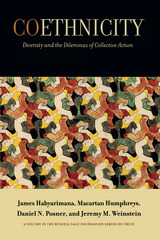

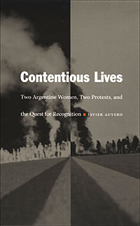
Auyero reconstructs Nana’s and Laura’s biographies through oral histories and diaries. Drawing on interviews with many other protesters, newspaper articles, judicial records, government reports, and video footage, he provides sociological and historical context for their stories. The women’s accounts reveal the frustrations of lives overwhelmed by gender domination, the deprivations brought about by hyper-unemployment and the withering of the welfare component of the state, and the achievements and costs of collective action. Balancing attention to large-scale political and economic processes with acknowledgment of the plurality of meanings emanating from personal experiences, Contentious Lives is an insightful, penetrating, and timely contribution to discussions of popular resistance and the combined effects of globalization, neoliberal economic policies, and political corruption in Argentina and elsewhere.
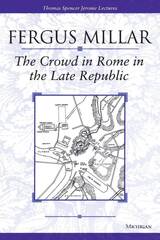
In this important study, Fergus Millar explores the development of the Roman Republic, which, as it drew to a close in the middle decades of the first century B.C.E., had come to cover most of Italy. There were nearly a million adult male voters in the time of Cicero, but there were no constituencies, and no absentee ballots. To exercise their rights, voters had to come in person to Rome and to meet in the Forum. Millar takes the period from the dictatorship of Sulla to Caesar's crossing of the Rubicon and shows how the politics of the crowd was central to the great changes that took place year after year, and altered the Republic forever.
The originality of Millar's highly accessible work lies first in its serious treatment of the importance of open-air oratory in Roman public life, and second, in its use of the narratives of events that evidence provides. Third, it refuses to interpret these narratives in the light of modern theories about the importance of the client-patron system, or the domination of the Senate. This work questions how we should understand the Roman Republic: as a network of aristocratic families dominating the people, or an erratic and volatile democracy in which power was exercised by the tiny proportion of citizens who actually came to listen to speeches and to vote.
This work speaks to those interested in ancient history and its consequences in the modern world.
Fergus Millar is Camden Professor of Ancient History, Brasenose College, Oxford University.
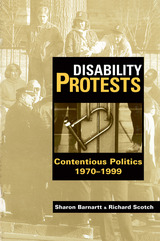
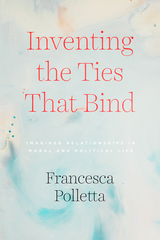
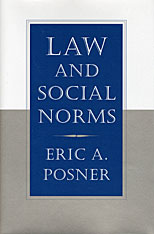
What is the role of law in a society in which order is maintained mostly through social norms, trust, and nonlegal sanctions? Eric Posner argues that social norms are sometimes desirable yet sometimes odious, and that the law is critical to enhancing good social norms and undermining bad ones. But he also argues that the proper regulation of social norms is a delicate and complex task, and that current understanding of social norms is inadequate for guiding judges and lawmakers. What is needed, and what this book offers, is a model of the relationship between law and social norms. The model shows that people's concern with establishing cooperative relationships leads them to engage in certain kinds of imitative behavior. The resulting behavioral patterns are called social norms.
Posner applies the model to several areas of law that involve the regulation of social norms, including laws governing gift-giving and nonprofit organizations; family law; criminal law; laws governing speech, voting, and discrimination; and contract law. Among the engaging questions posed are: Would the legalization of gay marriage harm traditional married couples? Is it beneficial to shame criminals? Why should the law reward those who make charitable contributions? Would people vote more if non-voters were penalized? The author approaches these questions using the tools of game theory, but his arguments are simply stated and make no technical demands on the reader.
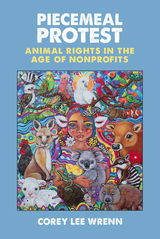
Given their tendency to splinter over tactics and goals, social movements are rarely unified. Following the modern Western animal rights movement over thirty years, Corey Lee Wrennapplies the sociological theory of Bourdieu, Goffman, Weber, and contemporary social movement researchers to examine structural conditions in the animal rights movement, facilitating factionalism in today’s era of professionalized advocacy.
Modern social movements are dominated by bureaucratically oriented nonprofits, a special arrangement that creates tension between activists and movement elites who compete for success in a corporate political arena. Piecemeal Protest examines the impact of nonprofitization on factionalism and a movement’s ability to mobilize, resonate, and succeed. Wrenn’sexhaustive analysis of archival movement literature and exclusive interviews with movement leaders illustrate how entities with greater symbolic capital are positioned to monopolize claims-making, disempower competitors, and replicate hegemonic power, eroding democratic access to dialogue and decision-making essential for movement health.
Piecemeal Protest examines social movement behavior shaped by capitalist ideologies and state interests. As power concentrates to the disadvantage of marginalized factions in the modern social movement arena, Piecemeal Protest shines light on processes of factionalism and considers how, in the age of nonprofits, intra-movement inequality could stifle social progress.
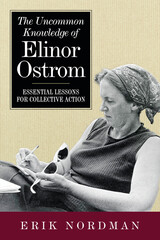
In The Uncommon Knowledge of Elinor Ostrom, author Erik Nordman brings to life Ostrom’s brilliant mind. Half a century ago, she was rejected from doctoral programs because she was a woman; in 2009, she became the first woman to win the Nobel Prize in Economics. Her research challenged the long-held dogma championed by Garrett Hardin in his famous 1968 essay, “The Tragedy of the Commons,” which argued that only market forces or government regulation can prevent the degradation of common pool resources. The concept of the “Tragedy of the Commons” was built on scarcity and the assumption that individuals only act out of self-interest. Ostrom’s research proved that people can and do act in collective interest, coming from a place of shared abundance. Ostrom’s ideas about common resources have played out around the world, from Maine lobster fisheries, to ancient waterways in Spain, to taxicabs in Nairobi. In writing The Uncommon Knowledge of Elinor Ostrom, Nordman traveled extensively to interview community leaders and stakeholders who have spearheaded innovative resource-sharing systems, some new, some centuries old. Through expressing Ostrom’s ideas and research, he also reveals the remarkable story of her life.
Ostrom broke barriers at a time when women were regularly excluded from academia and her research challenged conventional thinking. Elinor Ostrom proved that regular people can come together to act sustainably—if we let them. This message of shared collective action is more relevant than ever for solving today’s most pressing environmental problems.
READERS
Browse our collection.
PUBLISHERS
See BiblioVault's publisher services.
STUDENT SERVICES
Files for college accessibility offices.
UChicago Accessibility Resources
home | accessibility | search | about | contact us
BiblioVault ® 2001 - 2024
The University of Chicago Press









